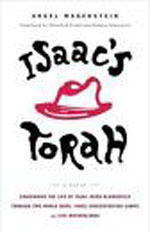|
By Laurel Corona
 SAN DIEGO—Isaac Jacob Blumenfeld does not think it coincidental that the Torah has five books and he has five different motherlands, all without pulling up roots from his hometown of Kolodetz. Caught up in the shifting borders and alliances that redefined Poland in the twentieth century, Isaac recounts the five major chapters of his life before, during ,and after the two world wars, in a narrative that Bulgarian author Angel Wagenstein, himself a concentration camp survivor, claims is just as Isaac told it to him. SAN DIEGO—Isaac Jacob Blumenfeld does not think it coincidental that the Torah has five books and he has five different motherlands, all without pulling up roots from his hometown of Kolodetz. Caught up in the shifting borders and alliances that redefined Poland in the twentieth century, Isaac recounts the five major chapters of his life before, during ,and after the two world wars, in a narrative that Bulgarian author Angel Wagenstein, himself a concentration camp survivor, claims is just as Isaac told it to him.
Since the book is presented as a novel, it is never quite clear whether Isaac is an entirely fictional character, but that question recedes in importance as the reader begins to understand that this is more the story of a whole culture than an individual one.
Isaac’s narrative voice is brilliantly achieved, but much like the relative who is funny and smart but never stops talking, the book combines hilarious jokes, anecdotes, and poignant observations
Go to the top of right column
| |
 with significant stretches when it is easy for attention to wander. with significant stretches when it is easy for attention to wander.
The rewards are many here, though, among them old jokes and tales, which to many readers will be delightfully new. How the appearance of milk was once described to a blind man (who concluded it must look like the crook of an elbow feels) ends up as a metaphor for delusions of all sorts.
Sympathetic secondary characters abound, most notably Shmuel Ben-David, the rabbi of Kolodetz but also the chairman of the village Atheists’ Club, whose sermons are as thought-provoking as they are irreverent, and whose status as a rabbi is no protection from becoming cannon fodder at the front.
Altogether, Isaac’s Torah is an excellent and entertaining short course for those who would like an inside look at a now extinct Jewish culture in the Pale.
|

